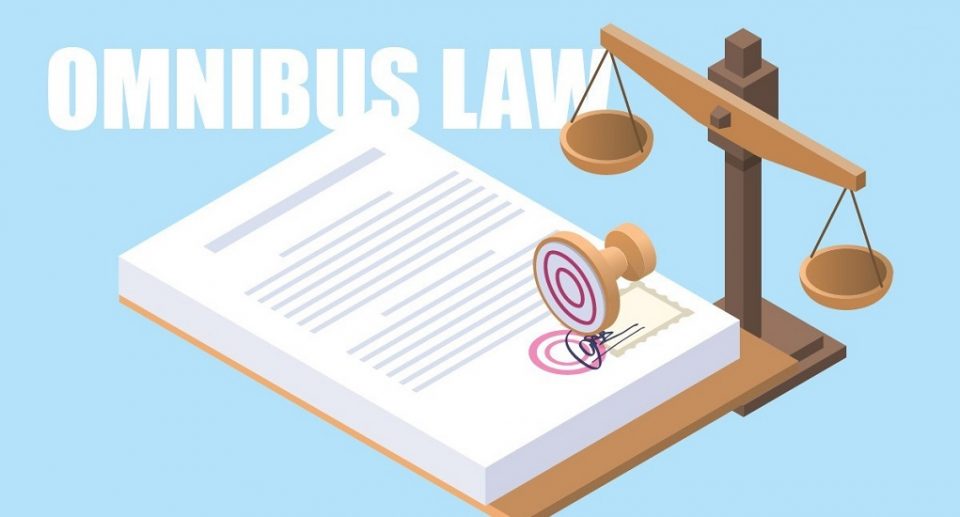The House of Representatives (DPR) has officially ratified the Work Creation Omnibus Law Bill (RUU) into a law at the DPR RI Plenary Meeting on Monday 5th October 2020.
DPR accelerated the schedule for the bill’s approval from the original schedule which was planned for 8th October, due to the rising rate of COVID-19 cases.
Masses of labourers were originally going to hold a demonstration on three consecutive days, 6-8th October, but they have been isolated in their respective regions. Attempts to hold demonstrations have been prohibited since the pandemic is still underway.
Meanwhile, the hashtag #MosiTidakPercaya appeared on social media. This hashtag has become the most popular topic on Twitter in Indonesia, conveying distrust towards DPR and the government after passing the controversial Omnibus Law.
The National Executive Director of the Indonesian Forum for Environment (WALHI), Nur Hidayati, admitted that the ratification of the bill was the culmination of the country’s betrayal of the people’s will.
“The ratification of the Omnibus Law on the Job Creation Bill is the culmination of state treason against the rights of workers, farmers, indigenous people, women, and the environment, as well as future generations,” Nur said.
She said the rejection of various elements of society did not hinder the steps of the DPR and the government to continue the discussion. In fact, DPR and the government had been unbothered by the public’s protests. “The ratification of the Job Creation Bill is an evil conspiracy by the legislative process which ignores the interests of human rights and the environment,” she said.
Nur herself noted that there are several crucial things in the Omnibus Law provisions related to environmental issues. Some of them are related to the elimination of environmental permits as a condition for issuing business permits, reducing the norms of absolute liability and corporate criminal liability, and extending the period of forestry permits and land-based permits.
The regulations will further perpetuate capital domination and accelerate the rate of environmental damage. In addition, the Omnibus Law reduces and even eliminates public participation in the judiciary space and in licensing business activities.
The Omnibus Law consists of 15 chapters and 174 articles regulating employment, the environment, and other sectors. The government, represented by the Coordinating Minister for the Economy, Airlangga Hartarto, said the Omnibus Law was needed to increase the effectiveness of bureaucracy and to increase employment, therefore providing benefits for the community and the government.
“We need simplification, synchronisation, and trimming of regulations. For that, a Job Creation Bill is needed; revising several laws that hinder the achievement of goals and job creation,” said Airlangga.
Meanwhile, Chairman of the Indonesian Parliament Puan Maharani said the Omnibus Law could build a better business ecosystem. According to Puan, discussions of the bill started by DPR and the government went on from April to October 2020.
“This bill has been completed by the government and DPR through intensive discussions and carried out openly, carefully, and by prioritising national interests, both in the short and long-term,” she said.
Several problematic and controversial articles in Chapter IV concerning manpower in the Job Creation Law includes the following:
Article 59
Removes the rules regarding the period of a certain time work agreement (PKWT) or contract workers. Article 59 paragraph 4 of the Job Creation Law states that provisions regarding the type and nature or activity of work, period of time, and deadline for extension of a work agreement for a certain period of time are regulated by government regulations.
Previously, the Manpower Law stipulated that PKWT could be held for a maximum of two years and could only be extended once for a maximum period of one year. This new provision has the potential to provide power and flexibility for employers to retain the status of contract workers indefinitely.
Article 79
The right of workers to get two days off in one week which was previously regulated in the Manpower Law is trimmed. Article 79, paragraph 2, letter b states that workers are obliged to be given a weekly rest period of one day for six working days in one week.
In addition, Article 79 also eliminates the obligation of companies to provide a two-month-long sabbatical for workers who have worked for six consecutive years which had applied every multiple of the six-year working period. Article 79, paragraph 3 only regulates the granting of annual leave of at least 12 working days after the worker or has worked for 12 continuous months. Paragraph 4 of the article states that the implementation of annual leave is regulated by a work agreement, company regulations, or a collective working agreement. Paragraph 5 then says that certain companies can provide long breaks that are regulated in work agreements, company regulations, or collective working agreements.
Article 88
Changes in policies related to worker wages are included in the law. Article 88, paragraph 3 in the Manpower chapter only mentions seven wage policies, where previously 11 wage policies existed in the Manpower Law. The seven policies, namely the minimum wage; wage structure and scale; overtime pay; wages for not coming to work and/or not doing work for certain reasons; form and method of payment of wages; things that can be calculated with wages; and wages as a basis for calculation or payment of other rights and obligations.
Several policies related to wages that were removed include wages for exercising their right to work breaks, wages for severance pay, and wages for calculating income tax.
Article 88, paragraph 4 states, “Further provisions regarding wage policies shall be regulated in a government regulation.”
Abolished Articles of the Manpower Law
Regulations regarding sanctions for employers who don’t pay wages according to the provisions are now terminated.
Article 91, paragraph 1 of the Manpower Law regulates that the wage determined by agreement between the employer and the worker, or the workers or labour union, must not be lower than the wage provisions stipulated in the prevailing laws and regulations.
Then, paragraph 2 states that in the event that the agreement as referred to in paragraph 1 is lower or contradicts statutory regulations, the agreement is null and void, and the employer is obliged to pay the worker’s wage according to the prevailing laws and regulations.
Apart from being stated in Article 91, the rules regarding the prohibition of paying wages under the provisions are also explained in Article 90 of the Manpower Law. However, in the Omnibus Law, the provisions of the two articles in the Manpower Law are completely abolished.
In addition, the Omnibus Law removes the rights of workers to apply for layoffs (PHK) if they feel that they have been disadvantaged by the company or Article 169.
Article 169, paragraph 1 of the Manpower Law states that worker or labourers can apply for layoffs to industrial relations dispute resolution institutions if the company, among others, abuses, insults, or threatens them. Layoff applications can also be made if the company doesn’t pay wages on time for three consecutive months or more.
This provision is followed by paragraph 2, which states that workers will receive double severance pay; reward pay for one term of service, and compensation pay for rights as regulated in Article 156. However, Article 169 paragraph 3 states that if the company is not proven to have committed an act as reported to an industrial relations dispute settlement agency, workers will not obtain this right.
Source: CNN Indonesia and Kompas
Image: Trent Tronik




